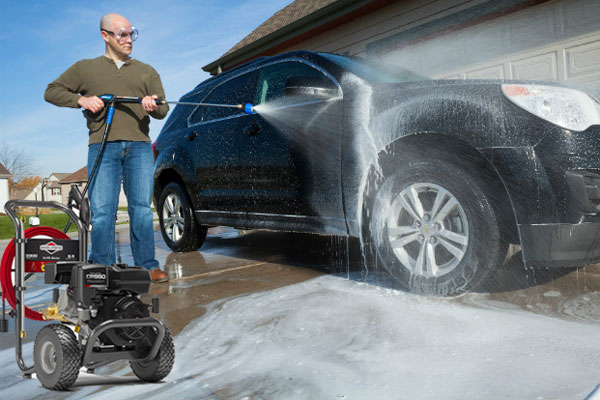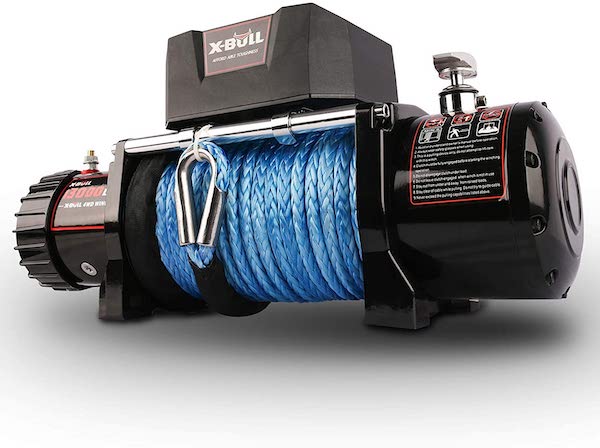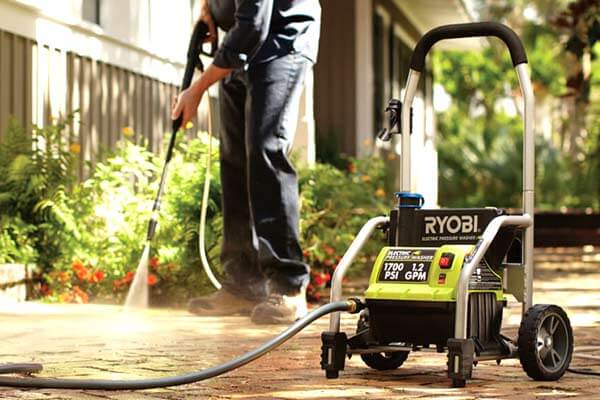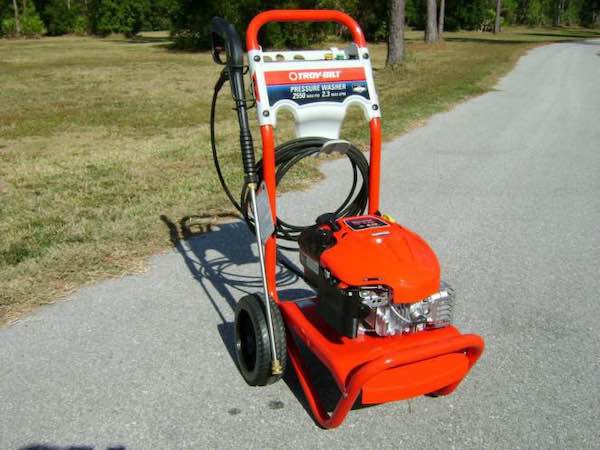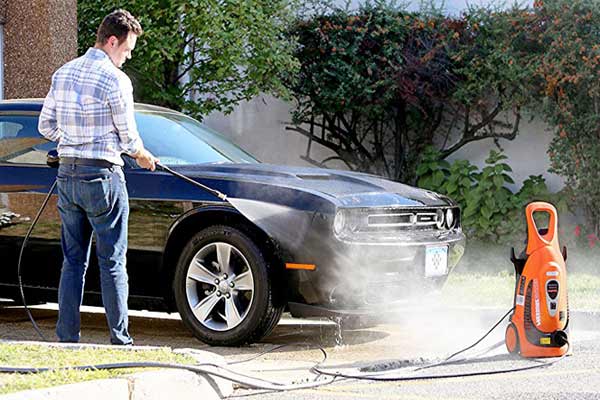The 10 Best Briggs And Stratton Pressure Washer Reviews
Are you finding it hard to purchase the right Briggs and Stratton pressure washer? Of course, we find it easier to use a machine for cleaning the deck, vehicles, and home exteriors, unlike using our hands with several days of scrubbing.
Today, homeowners can accomplish many things, including cleaning their vinyl siding grime every spring, scouring the whole in-ground swimming pool in the back yard without much effort, and washing their automobiles at least weekly. All these are thanks to the power washer high-powered water jet.
You can choose from tons of brands, including these Ryobi pressure washer units. Nevertheless, today, we are focusing on the top Briggs and Stratton surface cleaner options because the manufacturer has fantastic models, ranking among the best in the pressure-washer market right now.
Note that Briggs and Stratton power washer machines come with multiple pressure output levels. It’s always best to wash cars with the lightest possible settings as high-pressure jets can ruin the paint job.
A medium or light-duty device like a 2,000 PSI electric pressure washer will be adequate for seasonal power washing tasks in the home. Several of these generac pressure washer brands fall in that category.
However, you’ll want to get a gas-powered pressure washer if you will be using the machine more often. Apart from Briggs and Stratton pressure washer versions, a few of GreenWorks pressure washer models also fit that description of gasoline-based engines. Motor pumps running on gas usually force out more water with more powerful flow rates.
Moreover, gas motor pumps have the extra convenience in portability because of their independent power source that doesn’t require plugging into an outlet. Thankfully the finest Briggs and Stratton pressure washer devices are available both as gas and electric options.
Briggs And Stratton Pressure Washer: Everything You Must Know
While we often think that more is better, it may not necessarily be so about power-washing equipment. For example, you should never clean your vehicle using a 4,000 PSI Briggs and Stratton pressure washer, unless it’s a way of removing the paint from your car. So, you are probably already asking, ‘How much PSI do I need in a power washer?
It is the first question you should be asking if you are obtaining a pressure-based cleaner for your home’s external washing needs. Even so, there are several categories of external cleansing activities with unique difficulties and requirements.
Hosing down dirty and grimy concrete floors, patios, plus oil-stained garage surfaces, for instance, is totally different from washing your automobile. But in both cases, you won’t be using copious elbow grease levels and time to complete the task.
It means nearly every home needs pressure washing equipment. You’ll not only use less time and energy but also make sure your outdoors are as clean as new. However, we always caution our readers never to take a power washer lightly, particularly when looking at a heavy-duty Briggs and Stratton pressure washer.
A powerful, outdoor pressure machine can be a piece of serious equipment. It is particularly dangerous, bearing in mind that it pumps water through a smaller nozzle, resulting in approximately sixty times the regular pressure-levels of the ordinary garden hose.
The piece of equipment can ruin many delicate items, such as car paint and outdoor furniture. It becomes a factor of paramount significance to select a suitable model for your power washing needs. Also, it is also vital to learn the best usability techniques for the machine to guarantee excellent results.
It will take considerably less pressure to clean the salt residue, dust, or dirt from your vehicle then washing away layers of oil stains from the garage. The best thing about the Briggs and Stratton pressure washer is that it comes with multiple accessories providing the flexibility for ultimate cleaning.
The product also gets outstanding company backing with a one-year warranty and a helpful customer support team.
So, before we show you our top Briggs and Stratton pressure washer selections, let’s give you the tips for purchasing the right power washing machine.
How To Find The Right Pressure Washer?
You must first understand what a power washer is and how it works to make an educated purchase decision. The design and functioning of this tool is a one-part air compressor and a one-part garden hose.
An ordinary one either has an electrically powered motor or a gasoline-fueled engine to power its water pump.
It helps to accelerate the movement of the garden hose supplied water and building up the fluid pressure. A high pressure rated hose connects to the washer on one end and a water gun on the other end. Pulling the trigger causes the high-pressure water to mix with air and come out through the nozzle.
You can blast surfaces clean with pressurized water jets at around seventy-five times the pressure of a garden hose. If not, you can set the machine for gentle spraying using lower pressures, especially for cleaning delicate items.
Note that GPM and PSI are the common ratings for this equipment. It means there are two important terms to understand when selecting the right Briggs and Stratton pressure washer. A combination of the two terminologies determines any washer’s overall cleaning performance. The higher the stats, the quicker you will clean.
- GPM: A power washing machine Gallons Per Minute is the measure of the flow of water to the spray gun, giving you the power to disintegrate and wash away dirt.
- PSI: You’ll encounter this word several times in your shopping endeavor. The Pounds Per Square Inch, or PSI, is the output measure of water pressure. In simple terms, the pounds per square inch deliver the power you need to get past all the grime and dirt.
Electric vs. Gas Pressure Washer
Understanding the difference between electric and gas-powered pressure machines is vital in getting the best Briggs and Stratton pressure washer for your needs. The majority of light-duty power washers run off the electricity supply in your home.
The common features across these electric models include compactness, portability, and quiet motors. Nearly all electric units are available in hoses and power cords, ranging between twenty-five to thirty feet, and about thirty-five feet, respectively.
The more potent medium-duty and heavy-duty units use gas engines. Gas engine power-washers are an excellent choice for those who work outdoors with limited access to the electricity supply. You’ll want to get the gasoline-run pressure machines when electric energy or is hard to find or if joining extension cords will be inconvenient and dangerous.
Product cost is another significant dissimilarity between the two types of power-washers. The cost of gas-based power tools can range from about 250 dollars to 500 dollars. In comparison, its electric counterpart can cost between 100 dollars and 250 dollars.
Here is a quick comparison chart for the two categories of pressure washer units.
Gas Pressure Washer
Electric Pressure Washer
What You Should Know About The Pressure Washer Nozzles?
It is vital to keep in mind that “more isn’t always better” if you’re looking for the right Briggs and Stratton pressure washer to keep your outdoors clean. It’s very easy for an overpowered pressure machine to damage a lot of hard surfaces in households if you don’t follow safety precautions.
That’s why it is essential to carefully consider your home cleaning requirements before purchasing a power washer.
These units’ biggest dangers come in the angle and high-pressure spray jets controlled by a nozzle at the tip of a spray wand. Pressure washing machines usually vary by brand.
However, in most cases, they come with an all-in-one regulating nozzle or a set of interchangeable nozzles with color codes. In both cases, you can change the spray vertex angle of water to suit the cleaning task.
Adjustable spray wands provide a more convenient solution than replaceable nozzles. You can always modify the spray pattern or width with a simple twist. Nevertheless, replaceable connector-tips have specific spray angles, allowing you to tailor the spray pattern.
Here are the color codes and what they do:
Red or 0˚ Nozzle
It is ideal for eliminating the toughest stains and dirt from hard surfaces like concrete, cleaning second-story siding, and crevices. The zero-degree nozzle can cause severe injuries at closer distances.
It’s the main reason we do not recommend using it. Instead, you can get the same results with more time on a higher-pressure nozzle, without compromising your safety.
Yellow or 15˚ Nozzle
It’s the best choice for heavy-duty concrete cleaning, including garage floors and driveways, as well as removing grease and paint from hard surfaces.
Green or 25˚ Nozzle
It is an excellent choice for general-purpose cleaning of outdoor patios, decks, furniture, and walks.
White or 40˚ Nozzle
It’s advisable to use this option for delicate or easy to damage surfaces, like stucco walls and siding. It is also the best solution for cleaning cars.
Black or Low-pressure Nozzle
You can only use the black interchangeable nozzle with cleaning agents. Connecting this tip will automatically decrease pressure, triggering the power washer to siphon from the detergent tank and water supply, respectively.
What About PWMA Certification?
If you’ve been shopping around for the best Briggs and Stratton pressure washer, it means you’ve already come across models advertising the ‘PWMA Certified‘ badge. Why is this symbol important?
The Pressure Washer Manufacturers’ Association or PMWA is a third-party testing program that tests and validates performance claims by different pressure washer brands.
It’s essential to look for the organization’s mark of quality in every washer unit you intend to purchase. The certification program gives unbiased and verified performance data to consumers.
It’s not unusual for power washer manufacturers to quote their machines’ pressure and flow rate stats. In this way, consumers get to know the performance of a specific Briggs and Stratton pressure washer and make the best selection for their cleaning needs.
However, the advertised ratings for these models are not always accurate. Inconsistent GPM and PSI ratings among manufacturers can be misleading, resulting in less than expected performance levels.
For this reason, the leading power washer manufacturing brands, such as Briggs and Stratton, came together to form the PWMA. The merger led to the creation of the PW-101, a uniform industry standard for determining pressure and water flow.
Therefore, the ‘PWMA Certified’ symbol verifies the claims about a pressure-washing tool’s primary performance features.
Life-Saving Power Washer Safety Considerations
Thousands of people end up in hospitals with pressure washer related injuries. Do not be curious to find out what would follow by spraying your foot or hand. The water velocity is capable of tearing through your skin and tissue, causing a serious bacterial infection.
The minimum or zero degree setting on an adjustable unit focuses all the water pressure into a tiny blast, posing an unnecessary safety hazard. While it may take a bit of time, you can still have the same effective clean results in a wider-angle setting.
You can discard the red nozzle if you’re not a trained expert, to minimize the risks of property damage or injuries.
Besides, you need to watch out for more than the full water force when using a pressure washer. Even though all models are noisy, gasoline power washers are significantly louder.
It’s always a good idea to get your hearing protection when using or to work near this type of appliance. Alternatively, stretching out the hose will give you a safe working distance from the engine’s loud humming.
The Dos When Using A Pressure Washer
- Read and understand the manufacturer’s instructions or user manual.
- Be in protective wearables, including sturdy shoes, goggles, and long pants.
- Take extra precaution on wet surfaces as they can easily become slippery.
- Begin with the widest spray vertex angles at all times.
- Start by placing the tip at least two feet away from the floor and move closer when necessary.
- If your washer unit has replaceable spray wands, always stop the engine and drain excess water by pressing the trigger before interchanging the tips.
- Always do a surface test-wash from a small non-noticeable area to master how the machine works.
- Take extra caution when washing or rinsing vehicles by using a garden hose, which is gentler on the paint job.
The Don’t When Using A Pressure Washer
- Don’t move the sprayer tip more than six-inches closer to the surface you are cleaning to avoid pockmarking your driveway’s asphalt, gouging holes in your deck wood, damaging paint, or puncturing your vehicle’s tires.
- Don’t stand on a ladder when using a power washing machine. Recoil from pressing the trigger could throw you off balance.
- Don’t use an extension cord with an electric pressure washer to avoid risking electric shock.
- Don’t let the gas-powered pressure washer’s engine run for long without pulling the trigger. You could overheat and ruin the pump.
- Don’t point the sprayer tip towards pets, people, or yourself.
The 10 Best Briggs and Stratton Pressure Washer Reviews
Here is our selection of the ten best Briggs and Stratton pressure washer models. We’ve also given you a bonus unit after the ten to boost your power cleaning options.
1) Briggs and Stratton 020681 2000 PSI Pressure Washer
You can upgrade your outdoor cleaning potential with the 02681 Briggs and Stratton pressure washer. It comes in three colors of Titanium, Red, and Gray, with several accessories.
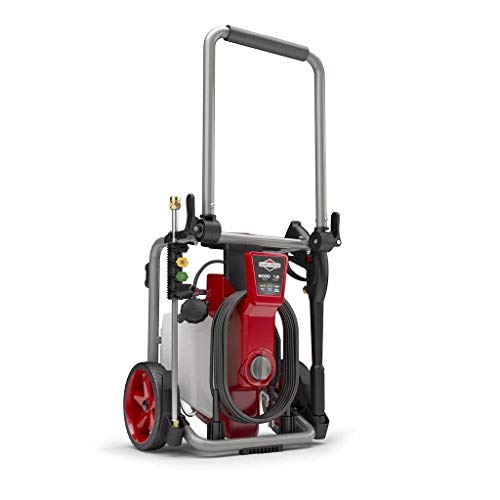
Features
- Maximum 2000 PSI
- Brushless induction motor
- 35-foot power cord
- Four easy-connect spray wands
- Twenty-five-foot flexible hose
- One turbo nozzle
- MIL-STD 810G-516.6 certified
- Seven-inch solid wheels
- Built-in half-gallon detergent tank
- A maximum flow rate of 1.2 GPM
- PWMA certified
- Weighs 39.95 pounds
2) Briggs and Stratton S2000P MAX 2000 PSI Pressure Washer
The S2000P is one of the finest Briggs and Stratton pressure washer models you can get in the market right now. It is available in two PSI settings to handle multiple cleaning jobs.
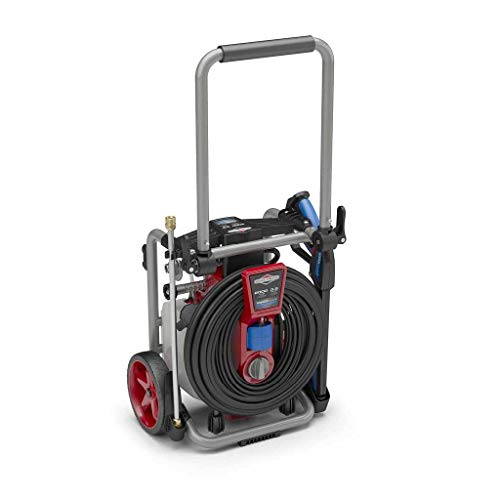
Features
- Maximum 2000 PSI
- Brushless induction motor
- Minimum 80 PSI
- 35-foot power cord
- Twenty-five-foot flexible hose
- MIL-STD 810G-516.6 certified
- A maximum flow rate of 3.5 GPM
- 1 GPM minimum water flow
- PWMA certified
- Powerflow Plus technology
- Comes with ½ gallon built-in detergent tank
- Durable, steel frame
- 7-in-1 spray wand
- Foldaway storage design
- 7-inch sturdy wheels
- Weighs 43.25 pounds
3) Briggs and Stratton S2200 MAX 2200 PSI Pressure Washer
Turn up the pressure and blast away any dirt and grime from your outdoor spaces.
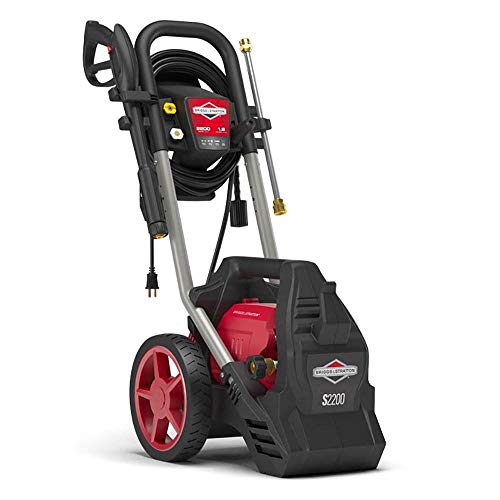
Features
- Maximum 2200 PSI on 1.0 GPM
- Minimum 900PSI with 1.2 GPM
- Four easy-connect spray wands
- Brushless induction motor
- Turbo nozzle
- 35-foot power cord
- Twenty-five-foot flexible hose
- MIL-STD 810G-516.6 certified
- PWMA certified
- Detergent foamer
- 9-inch sturdy wheels
- Weighs 41.25 pounds
4) Briggs and Stratton Elite 3300 PSI Pressure Washer
The Elite 3300 is among the top-of-the-line units at Briggs and Stratton with a heavy-duty, durable engine.
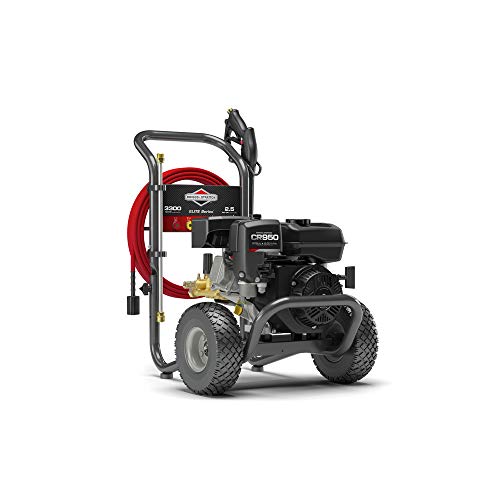
Features
- Maximum 3300 PSI on 2.4 GPM settings
- Whole steel base
- 5 maximum GPM rate with 3100 PSI
- Five quick-connect spray wands
- 208 cc engine with 9.5 foot-pound torque
- Adjustable pressure regulator
- Built-in detergent siphoning hose
- Thirty-foot flexible hose
- PWMA certified
- 10-inch pneumatic wheels
- Weighs 65 pounds
5) Briggs and Stratton S3400 1150 Series Pressure Washer
Unlock your cleaning power with this S3400 Briggs and Stratton pressure washer, allowing you to use less time being furious and more time doing the chores.
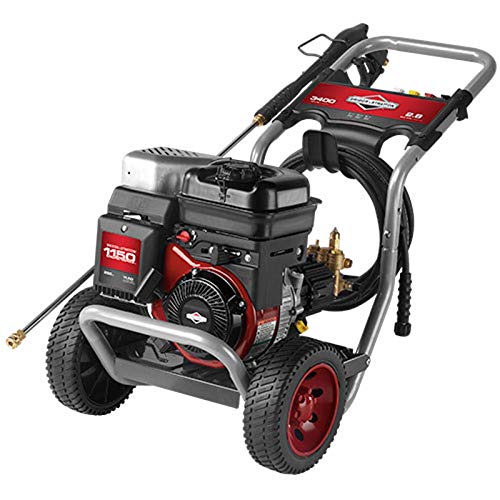
Features
- Maximum 3400 PSI on 2.5 GPM settings
- Whole steel base
- 8 maximum GPM rate with 2900 PSI
- Four quick-connect spray wands
- 250 cc engine with 11.50 foot-pound torque
- Easy-Start engine technology
- Integrated detergent injector
- Thirty-foot flexible hose
- PWMA certified
- 10-inch pneumatic wheels
- Weighs 68 pounds
6) Briggs and Stratton S3200 Pressure Washer
If you’re in the market for a high-end Briggs and Stratton pressure sprayer, the S3200 series has everything you would want in a gasoline-based power washer.
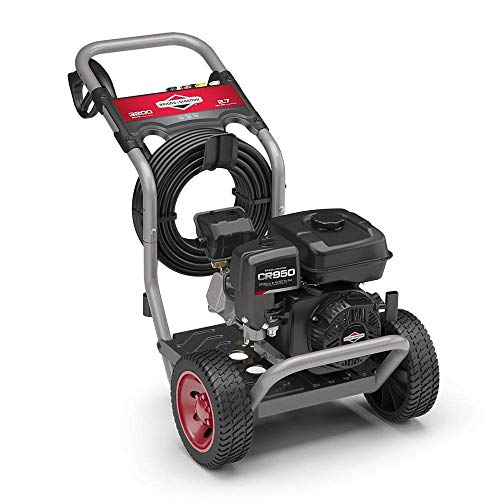
Features
- Maximum 3200 PSI on 2.4 GPM settings
- Steel frame
- 7 maximum GPM rate with 2600 PSI
- Four quick-connect spray wands
- 208 cc engine with 9.50 foot-pound torque
- Easy-Start engine technology
- The integrated detergent siphon hose system
- Thirty-foot flexible hose
- PWMA certified
- 10-inch sturdy wheels
- Weighs 67.5 pounds
7) Briggs and Stratton Elite 4000 MAX 4000 PSI Pressure Washer
Are you looking for a power cleaning machine that will guarantee a quicker, cleaner siding, patio, or deck? The 2100 Series brings you all the numbers you’ll want in a gas-powered model.
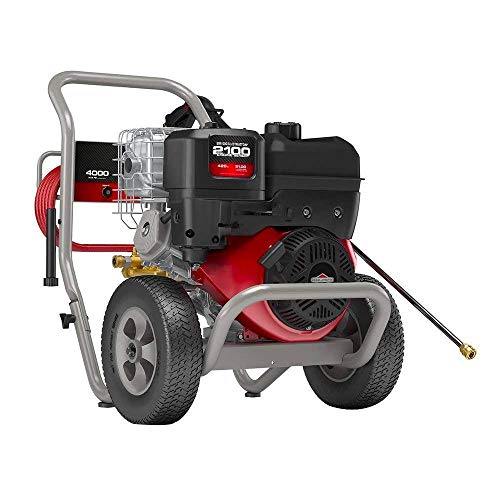
Features
- Maximum 4000 PSI on 4.0 GPM settings
- Whole steel base
- 0 maximum GPM rate with 4000 PSI
- Five quick-connect spray wands
- 420 cc engine
- Adjustable pressure regulator
- Easy-Start engine technology
- Integrated detergent injector
- Fifty-foot flexible hose
- PWMA certified
- 12-inch pneumatic wheels
- Weighs 99.8 pounds
8) Briggs and Stratton 875EXi Series 3100 PSI Pressure Washer
The 875EXi is an ideal tool for dealing with outdoor furniture, boats, driveways, and cars, without the noise you’ll find in other gas-run machines. It packs plenty of features for sprucing up your outdoor surfaces.
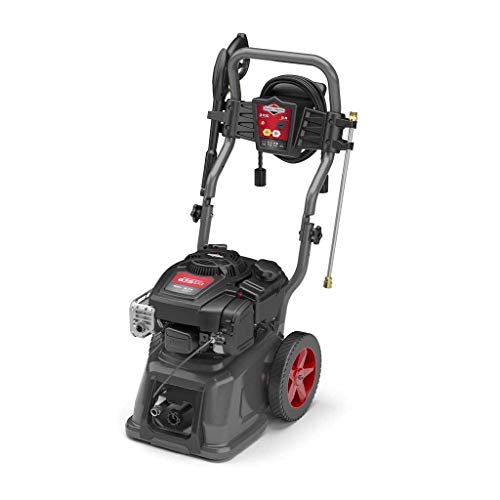
Features
- Quiet Sense innovation
- Maximum 3100 PSI on 2.1 GPM settings
- Whole steel base
- 5 maximum GPM rate
- Four quick-connect spray wands
- 1900 cc engine with 8.75 foot-pound torque
- ReadyStart engine technology
- Integrated detergent tank
- Thirty-foot flexible hose
- PWMA certified
- 9-inch sturdy wheels
- Weighs 59 pounds
9) Briggs and Stratton S3100 MAX 3100 PSI Pressure Washer
Get this S3100 pressure washer to knock out the big cleaning jobs with more power for extended durations. The gasoline-powered engine cuts the cord, allowing you to move anywhere while washing.
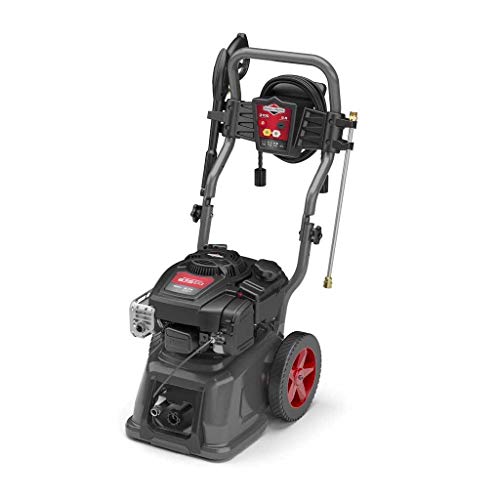
Features
- Maximum 3100 PSI on 2.1 GPM settings
- Whole steel base
- 5 maximum GPM rate
- Four quick-connect spray wands
- 1900 cc engine with 8.75 foot-pound torque
- ReadyStart engine technology
- Integrated detergent tank
- Thirty-foot flexible hose
- PWMA certified
- 9-inch sturdy wheels
- Weighs 59 pounds
10) Briggs & Stratton S1800 MAX 1800 PSI Pressure Washer
You’ll get this electric machine if you need a lightweight and portable unit. It is well-accessorized to cater to its low water pressure. It is available in a long-lasting foldaway design for convenient storage.
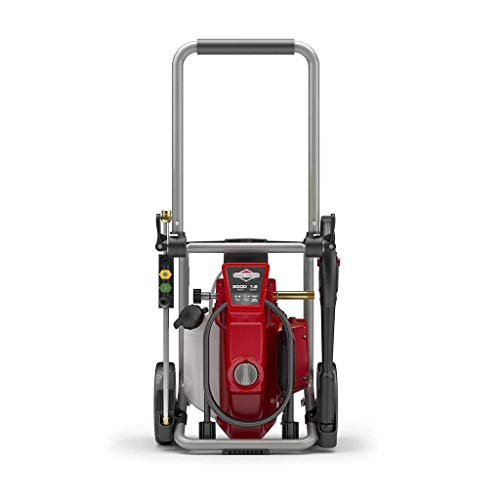
Features
- Seven-inch solid wheels
- Maximum 1800 PSI
- Up to 3 detachable spray wands
- Twenty-foot garden hose
- MIL-STD 810G-516.6 certified
- Universal motor
- Turbo nozzle
- Includes a half-gallon detergent tank
- 2 GPM maximum
- PWMA certified
- Weighs 26.54 pounds
Briggs and Stratton 6328 Surface Cleaner Pressure Washer
The fourteen-inch Briggs and Stratton pressure washer is the fastest tool for cleaning flat surfaces. It can give a deep clean for garage floors, decks, and driveways with up to four times faster the speed of a regular forty-degree nozzle.
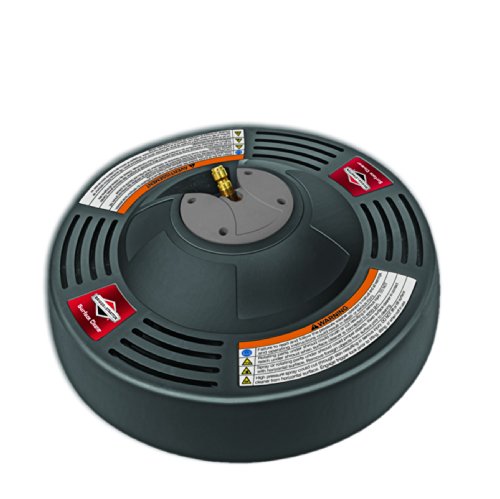
Features
- Maneuverable dome-like design
- Works with nearly all 2200 PSI to 3400 PSI gasoline power washers
- Integrated overspray protection
- Streak-free rotating jets
- Maximum 3200 PSI
- Compatible with easy-connect spray wands
- Weighs 3.52 pounds
We’ve given you ten of the best units plus one bonus model to help you harness the stress-free convenience of Briggs and Stratton pressure washer models through its exclusive range of tech.
Frequently Asked Questions (FAQ)
The Bottom Line
Pressure washing involves using water sprays at high-pressure to wash away mold, dust, chewing gum, loose paint, algae, dirt, mud, and grime from things or surfaces like vehicles, fences, and buildings, or asphalt and concrete flooring, including patios and driveways. You can choose from multiple brands, including the best Briggs and Stratton pressure washer units.
Note that all washer models come with an indication of their performance capacity in PSI and GPM. The higher the pounds per square inch, the more powerful the equipment. Moreover, the gallons per minute ratings can show you the best sprayers for cleaning with less water.
If you need more power for cleaning large driveways, siding, garages, and decks, consider one of the gas-run Briggs and Stratton pressure washer tools.
Gas models can clean large surfaces in less time than the electric-powered models. And while a corded-electric sprayer delivers more power, it is an excellent machine for dealing with small tasks such as cars, furniture, small patios, and decks.
In addition, electric-motorized power washers are lightweight, silent, need little upkeep, and are compact enough to store indoors with no winterizing.

